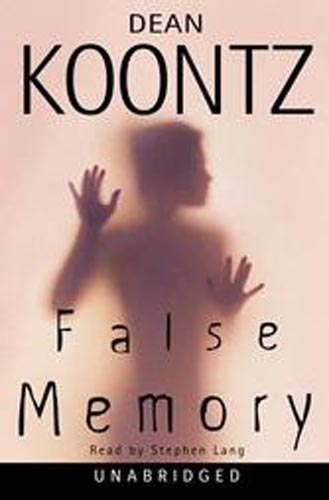To
that I can offer several answers. One is
that I don’t read that many novels, so any one is memorable and something I
want to record. Another is that I read False Memory around the time I
returned from a vacation to discover that the plate glass of my sliding door
had been broken, apparently by neighborhood children playing ball. The pet sitter taped a sheet of plastic in
its place, but it took some time for my landlord to replace it. On the one hand, no real harm was done. It
was in the middle of summer, so staying warm was not an issue. And I live in the back of a duplex that no
one passing by on the street is aware of, so there was no actual danger. But Dean Koontz has a way of inspiring
paranoia, so reading his novel with a window missing can be most unsettling.
Another
reason is the provocative title. During the 1990's, the recovered memory movement flourished, based on the belief that many
psychological problems were caused by childhood molestation that patient no
longer remembered, and that the cure was to recover those memories in
therapy. This, in turn, led to a
backlash, motivated by the belief that those memories were false and manufactured
by the therapist. The tension was especially
acute in a number of cases in which children in daycare had memories
“recovered” in therapy of frightful abuse and people were sent to prison based
on those “memories.”
Conceivably,
Koontz may be weighing in on the recovered memory controversy, on the side that
such memories were false. If that is
what he is trying to do, he signally fails.
Once and only once, Koontz makes a serious effort to take on the
issue. About pages 384-386, a doctor
recounts how he was assigned by the court to examine children who alleged they
had been sexually abused in preschool. Despite
shocking tales of abuse, he found no evidence of injury. Then he was alarmed to discover that the
psychiatrist examining the children was used hypno-regressive therapy. At this point, the characters ask the doctor
whether hypnosis is an accepted therapeutic technique. He answers that it is becoming less so
because hypnotized subjects are highly susceptible to suggestion, and children
especially so. Children, he says, can be
made to “remember” anything the therapist wants to hear. And then he found that the same psychiatrist
had unearthed similar “memories” in earlier investigations. These are all worthwhile points. However, they take up less than three
pages of a 627 page book. If Dean Koontz
actually wants to refute the recovered memory movement, the rest of his novel
does more harm than good.
Recovered
memory therapists made two main arguments against the false memory
movement. One was that the whole idea of
creating false memories is “junk science.”
The other is that, even if it is possible, it would be unethical for a
therapist to do such a thing. As to the
former point, it has been partially refuted.
Psychologists in controlled experiments have created false memories by the power of suggestion, especially
in children. How far this can go is not
clear because, as recovered memory advocates point out, any more extensive
experimentation would be unethical. What
is “junk science” and clearly not possible is exercising complete control over
another person, especially at a distance. Extensive,
highly unethical experiments on the subject have been conducted, mostly by the
Communists, but some by us, and it has clearly been proven impossible. Coercion is possible; “programming” is
not. And as for the argument that
creating false memories is unethical, no one is accusing recovered memory
therapists of creating false memories intentionally. The accusation is that, sincerely believing
there are genuine repressed memories of childhood abuse, recovered memory
therapists end up creating what they believe they are uncovering. Dean Koontz does not make either of these
points, however. He shows an evil,
unethical therapist transforming people into obedient robots under complete
mind control. This is no less a fantasy than vampires and werewolves.
But
that is not the primary reason I want to deliver a thorough-going dissection of
False Memories. The main reason is that the first 185 pages
or so give the distinct impression of being an earlier draft, before the author
had worked out the details of his premise.
Undoubtedly, he knew from the start it would be about mind control, but
he had not worked out the details of how
that mind control would work. Around
page 185, he decides and reveals to the audience what is going on, thus greatly
reducing the suspense as the characters struggle to figure it out. But the first 185 pages or so are replete
with clues as to what is going on that never go anywhere or are explained, and
that occasionally contradict the system he ultimately decides on. I will therefore focus the greatest attention
on the part before Koontz reveals his secret, pointing out the maddening clues
he leaves dangling. The next section,
from where he reveals what is happening to the reader until the characters
figure it out, I will be less thorough about.
And the final part, after the characters realize what is happening, I
will breeze through except for sections that particularly interest me.

No comments:
Post a Comment